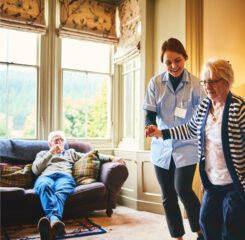Letting Go
In yoga, we talk about the yamas and niyamas, the ethical principles that underlie the yogic belief system. The yamas are referred to as moral restraints, things like not doing harm, not stealing and so on—five in all. The niyamas are the observances, things we should do like self-discipline, self-study and more, a total of five as well. Yoga practitioners all know the yamas and niyamas and use the concepts to guide their practices and, ideally, their lives.
After finishing my yoga teacher training in May, I decided to take an additional online course on living the yamas and niyamas. During the first class we were assigned one of the ten as the one we needed to work on, both in breakout sessions and in our homework. The instructor made a comment that the one we were assigned would likely be the one we did not want, the one we found most difficult to achieve. And, indeed, when my assignment popped up, it was exactly the one that elicited a groan and a brief flicker of “maybe I should just log off right now and not do this.” Of course, I didn’t but I won’t deny that my cursor did hover over that “leave meeting” button for a moment!
The niyama I was assigned to work on is one that is not just challenging for me but, as I have thought about it, challenging for all of us who work with older adults, especially in light of what we have all experienced in the last 18 months. The niyama is “isvara pranidhana” which literally means surrender. In its purest form it means recognizing a power greater than ourselves and allowing ourselves to trust and to surrender. As I’ve thought about this, and wrestled with it, I have not connected it with faith (although it certainly fits there and may be a very clear concept for those with a strong faith connection) but rather with the ability to let go.
It feels to me as if we have all been holding on so tightly since early 2020, feeling an intense need to control in a world that was spinning out of control. I suspect that you, like me, often felt (and still feel) like we must be hyper-vigilant, hyper-aware and hyper-focused. One of my team, talking about COVID, said vehemently “I won’t be fooled again,” referring to his belief that we could keep the virus out and finding, as we all did, that we could not. Every detail of infection control, testing protocols, cleaning, visitor control . . . the list goes on and on . . . has seemed to be vital to understand and vital to wrap our hands around.
As I’ve had the opportunity, virtually, to connect with many colleagues around the country during their LeadingAge state conferences, I have seen the exhaustion and stress in everyone’s faces. When asked what they are looking forward to as the world begins to return to normal, many of them could not even talk about what they wanted to do. We are all shell shocked, fighting some well-earned PTSD, carrying that ongoing anxiety on our shoulders.
But what if we made a conscious effort to let go of some of it? What if we took a long weekend and turned off our phones? What if we really took a hard look at ourselves and why we are so afraid to let go? If we enumerated our concerns and tried to remove the ones we can’t control from the list? What if we made another list of ways to care for ourselves and put at least one of those self-care opportunities on our calendar? None of this is easy, I know that with certainty. It is a challenge for me and a challenge for each of you. Let’s each choose one small thing that we do, one small thing that moves us toward letting go and accepting that not everything is, or should be, in our control.

Most Recommended
October 15, 2025
 Shutdown Week Three: Impact of Ongoing Closure on Affordable Housing
Shutdown Week Three: Impact of Ongoing Closure on Affordable Housing
December 10, 2025
Fiscal Year (FY) Funding 2026
October 07, 2025
Immigrant Workforce Matching Program Brings Workforce Relief
Recently Added
December 23, 2025
 CMS Debuts Models: ACCESS, ELEVATE and LEAD
CMS Debuts Models: ACCESS, ELEVATE and LEAD
December 22, 2025
GAO Report: Ensuring Accessible Healthcare
December 19, 2025
House Moves Forward on Affordable Housing Reforms
December 19, 2025



